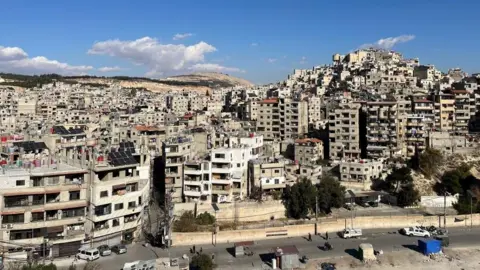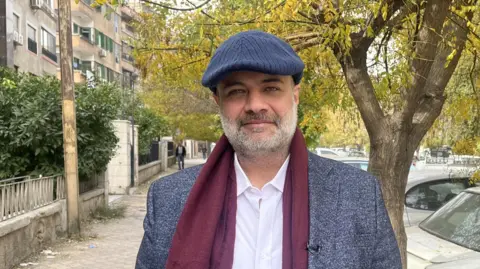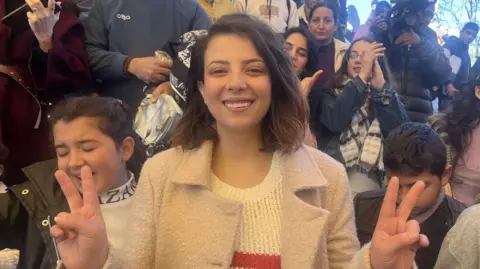 Aamir Peerzada
Aamir PeerzadaAs we drive into Mezzeh 86, a working-class neighborhood in western Damascus, we are waved through a checkpoint manned by Hayat Tahrir al-Sham (HTS) fighters.
The buildings are run down and in need of repair.
This area is dominated by members of Bashar al-Assad’s Alawite sect, an offshoot of Shiite Islam whose members form one of Syria’s largest religious minorities.
Alawites controlled power in the predominantly Sunni Muslim country during the Assad family’s 50-year rule, holding top positions in the government, military and intelligence service.
Now many in the community fear reprisals following the overthrow of the Assad regime by rebels led by HTS, a Sunni Islamist group that was once an al-Qaeda affiliate in Syria.
 EPA
EPADozens of Alawites we contacted by telephone refused to speak to us, and many said they were afraid.
In Mezzeh 86, the presence of HTS fighters at a checkpoint did not appear to be a cause for concern.
Many Alawites came and spoke to us in an effort to distance themselves from Assad’s regime.
“During the Assad regime, the stereotype about Alawites was that they had all the work opportunities and were rich. But in reality, most Alawites are poor and among thousands there is only one who is rich,” said Mohammad Shaheen, a 26-year-old pharmacy student.
“Even when HTS went to Alawite villages near the coast, they found that all the villages were poor. Only the Assad family accumulated wealth,” he added, referring to the Alawite heartland in the west of the country.
Hasan Dawood, a shopkeeper, chimed in: “We were slaves for him – drivers, cooks and cleaners.”
There is also a feeling of betrayal.
“Bashar was a traitor. And the way he fled was cowardly. He should have at least reached out to the people and told us what was going on. He left without saying a word, which made the situation chaotic,” Mohammad said.
But people from the Alawite community, and indeed from this neighborhood, served in Assad’s brutal security forces. Are they afraid of reprisals against them? we asked.
“Those who were in the military and did bad things fled. Nobody knows where they are. They are afraid of revenge,” said Thaier Shaheen, a construction worker.
“But people who don’t have blood on their hands are not afraid and are left behind.”
There have been reports of some reprisal killings in parts of the country, but so far there is no evidence that they were committed by HTS.
“We’re doing well so far. We speak to Hayat Tahrir al-Sham and they are respectful. But there are people who are not from HTS but pretend to be, making threats. They want our society to fail and they are the ones we are afraid of,” Mohammad said.
After taking control of Damascus, HTS and its allies said those members of the ousted regime who were involved in torture and killings would be held accountable, although it is so far unclear what that justice will be.
HTS also said the rights and freedoms of religious and ethnic minorities would be protected.
The group has a jihadist past from which it has distanced itself. But there is an Islamist present, and many are wondering what it will mean for Syria’s pluralistic society.
 Yogita Limaye
Yogita Limaye“I am so happy because the Assad regime has fallen. This is like a dream come true. Nobody wants to live under a dictatorship. But there are concerns. I have to be realistic,” said Youssef Sabbagh, a Christian lawyer.
“HTS are here now and they are an Islamic militia. That’s what they are. I wish, I pray, that they will be a modern Islamic militia.”
“I speak not only as a Christian, but also as a Christian, many Syrians, Muslims and everyone else: we don’t want Syria to become another Afghanistan, we don’t want to become another Libya. We have already suffered a lot.”
Syria’s Christian community is one of the oldest in the world and the country is home to some famous holy sites.
When the uprising against Assad began in 2011, Christians were initially cautious about taking sides, but eventually members of the community fought on both sides of the conflict.
Last week, the Archbishop of Homs, Jacques Murad, told the BBC that there had already been three meetings with HTS and that they had been able to honestly express their views and concerns.
So far, the signs are reassuring for many Christians.
Bars and restaurants serving alcohol are open in the Christian quarter of the Old City of Damascus and in other parts of the city. Christmas decorations are also hanging in many places.
In a restaurant in the Old City we met the lawyer Ouday al-Khayat, a Shiite Muslim.
“There is no doubt that there is anticipation and fear. The signs coming from HTS are good, but we have to wait and watch,” he said.
“It is not possible to know the opinion of all Shiites, but there is concern about a scenario similar to that in Libya or Iraq. However, I believe Syria is different. Syrian society has been diverse for a very long time.”
 Yogita Limaye
Yogita LimayeWe drove about 110 km (70 miles) southeast of Damascus through black volcanic hills to the town of Suweida, home to most of Syria’s Druze population.
The Druze faith is another offshoot of Shia Islam, but has its own unique identity and beliefs.
Many Druze were loyal to the Assad regime, which they believed would protect minorities.
But resistance grew steadily during the war, and there have been repeated protests in recent years.
The latest action began in August 2023 in the central square of Suweida and lasted until the regime was overthrown.
Activist Wajiha al-Hajjar believes the protests were not brutally suppressed like others in Syria because Assad wanted to show the world and his foreign allies that he was protecting minorities.
“They tried to suppress our protest, but in other ways – not with weapons or shelling, but by depriving us of passports and civil rights and access to official documents. It became difficult to leave Suweida and a sort of siege was imposed. “she said.
Hundreds still gather in the square every day. There was a celebratory atmosphere during our visit. Songs played from a loudspeaker and young girls and boys performed a gymnastics demonstration, their families clapping and cheering.
“We celebrate the fall of the regime, but this gathering is also a sign of strength. In case there is an extreme regime with extreme laws, we are ready to stay in this place and demand our rights and equality,” Wajiha said.
Suweida had a quasi-autonomous status under Assad, and the Druze want it to stay that way.
It is just one example of the diversity and complexity of Syrian society and the challenges facing the country’s new government.
Additional reporting by Aamir Peerzada, Leen Al-Saadi and Sanjay Ganguly






